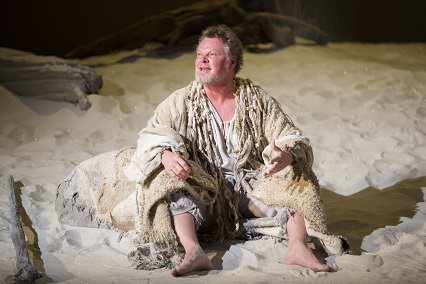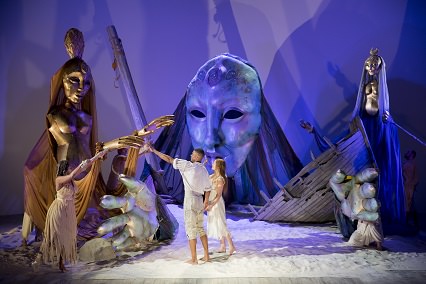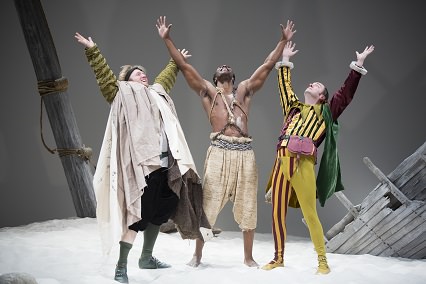“We work in the dark – we do what we can – we give what we have. Our doubt is our passion, and our passion is our task. The rest is the madness of art.”
Henry James’ words are a fitting tribute to the glorious Tempest of Ethan McSweeny; reminding us why art is important, and how it enriches our lives.
This Tempest, at the Shakespeare Theatre, Company is full of breathtaking imagery. Ariel (Sofia Jean Gomez) flies here, there and everywhere with the grace and ease of a ballerina. The three goddesses in the masque, Ceres, Iris, and Juno, appear as huge puppets, beautiful, strange, and frightening. The lovely Voice of Nancy Anderson adds richness and charm to the goddess’s scenes. The mysterious banquet table vanishing in the twinkle of an eye; the thunder, lightning, and mayhem of the storm; the solemn faces of the ensemble as they parade in giant headdresses; all capture the shimmering mystery at the heart of Shakespeare’s play; wondrous, evanescent, and full of deep meaning.

The Tempest has provoked many interpretations, all revealing just as much about the interpreter as they do about the play. The play has been viewed as an investigation of the nature and purpose of art; an allegory about colonialism; a psychoanalytical portrait of Prospero (ego), with Ariel as the superego and Caliban as the id; and a representation of the internalized oppression of women, specifically Miranda. The play restates a number of themes found in Shakespeare’s other plays; the recovery of lost prosperity and relationships; strife between brothers; the value of compassion and forgiveness; and misfortune transformed into good fortune in the end. But one thing everyone agrees on; it contains some of the greatest poetry in the English language. Director McSweeny has translated that poetry into a vibrant, powerful theatrical event.
Prospero (Geraint Wyn Davies) the former Duke of Milan, was betrayed by his wicked brother Antonio (Gregory Linington), who usurped Prospero’s dukedom when Prospero, immersed in his “secret studies” began neglecting it. Antonio conspired with Alonso, King of Naples (C. David Johnson), to expel Prospero and his two-year-old daughter, Miranda (Rachel Mewbron) from Milan.
Prospero uses his talents as a magician to wreck Antonio and his fellow conspirators, Alonso, and Alonso’s brother Sebastian (David Bishins) on an enchanted island. There, Prospero lives with his now teenaged daughter, Miranda, Ariel, a “delicate spirit” who assists him in his magic, and Caliban (Clifton Duncan), a native of the island and Prospero’s servant.
During the violent storm, Ariel disperses all the shipwrecked castaways intact onto various parts of the isle. The noble prince, Ferdinand (Avery Glymph), son of Alonso, is by himself. Antonio accompanies Alonso and Sebastian, along with the good old counselor Gonzalo (Ted van Griethuysen), and the younger lord Adrian (Avery Clark). The King’s drunken butler, Stephano (Dave Quay) and his jester, Trinculo (Liam Craig) find one another, and Caliban, on the island.
Clifton Duncan gives a nuanced performance as Caliban, hinting at the complexity of his character and, despite his brutality, his capacity for growth. It is sometimes painful to watch such a Caliban kneel to a drunkard (Stephano) and a fool (Trinculo); but the subtlety of Duncan’s performance makes this Caliban a striking and unique creation. Liam Craig (Trinculo) reminds us of the very best of Shakespeare’s clowns; it is impossible not to laugh, even when he simply walks onstage. Dave Quay (Stephano) is equally hilarious, with delightfully comic touches which add merriment to their scenes. The clowns’ encounters with Caliban are among the principal joys of the evening.
Geraint Wyn Davies’ Prospero has a kind, affectionate side, despite his irritability, which makes it all too clear why he would in the end choose forgiveness. Davies handles his occasional harshness with humor and brio, undercutting the bitterness without seeming false. To see him give the “our revels now are ended” speech is to realize once again the timelessness of Shakespeare’s genius. Here, Prospero reminds us that forgiveness is ultimately for ourselves; others may not respond or even notice.
As Miranda, Rachel Mewbron’s warmth and spirit link her to her father and make her a compelling heroine. The “abhorred slave” speech, in which she castigates Caliban, is here given to Prospero, which works beautifully given the overwhelming sweetness of her interpretation. She is especially fine in her love scene with Ferdinand, as her laughter turns to tears when she realizes how much she means to him. Ferdinand (Avery Glymph) and this Miranda make a charming and convincing pair of lovers, without a trace of glibness or insincerity. As Ariel, Sofia Jean Gomez bravely flies around the stage at Prospero’s bidding. Ariel and Prospero enjoy a close, almost romantic relationship which blossoms, predictably, as he makes good on his promise to free her forever.
Samuel Taylor Coleridge said of the conspirators: “Shakespeare never puts habitual scorn into the mouths of other than bad men.” It is a tribute to the actors that their interplay is never less than intriguing, despite their ill intentions. C. David Johnson as Alonso is especially moving in his grief for his son; and in the remorse which follows when he begins to understand the consequences of his actions. As Sebastian, Alonso’s brother, David Bishins is formidable and ultimately, menacing.

Gregory Linington has many strong moments as Antonio, particularly at the end when he appears to have second thoughts about his actions, and then exchanges looks with Prospero suggesting that their enmity will continue. Perhaps, like Richard III, he could enjoy his villainy even more! As Adrian, Avery Clark provides a much-needed glimpse of decency and optimism in the midst of this treacherous band.
Ted van Griethuysen’s Gonzalo is a wonder. His sly wisdom and boundless, if sometimes unwarranted, optimism, combined with his exceptional acting skills, make him a joy to watch. In his great speech, partly based on Montaigne’s essay “Of Cannibals,” (1603) van Griethuysen tenderly envisions a world free of suffering, want, and evil, reflecting his benign view of human nature.
The Boatswain (Sean Fri) and the Master (Matthew Pauli) skillfully convey (despite the storm) their efficiency and irritation with the second-guessing of the courtiers. Every one of the Mariners and Spirits, Freddie Bennett, Ross Destiche, Asia Kate Dillon, Ben Henderson, Dan Jones, Matthew Pauli, Stephanie Schmalzle, Kedren Spencer, Jessica Thorne, and , provides an evocative and stylish performance.

Scenic Designer Lee Savage, Costume Designer Jennifer Moeller, and Lighting Designer Christopher Akerlind have fashioned a brave new world for this production, which is every bit as fascinating as the poetry of the play itself. The technical team who helped them achieve these wonders is to be congratulated.
Sound Designer Nevin Steinberg and Composer Jenny Giering bring haunting and beautifully harmonic touches. Choreographer Matthew Gardiner shines especially in the dance of the Reapers.
Flying Director Stu Cox (Flying Effects provided by ZFX, Inc.), and Puppet Designer and Coach James Ortiz make a remarkable contribution to the astonishing visual images of the production.
“I specifically asked him to do The Tempest because he has the ability to create a magical world on stage, combining theatricality with a real attention to the language,” Shakespeare Theatre Company (STC) Artistic Director Michael Kahn said of McSweeny.
I still remember my amazement as a child when I opened a small blue book with tales from Shakespeare. The Tempest was my favorite, and Shakespeare Theatre Company’s production takes me back to that revelation.
This is Shakespeare at its very best with extraordinary acting, overwhelming spectacle, and deep insight into human nature. Don’t miss it!
Running Time: 2 hours, with one 15-minute intermission.
The Tempest plays through January 11, 2015, at Shakespeare Theatre Company’s Sidney Harman Hall – 610 F Street, NW, in Washington, DC. For tickets, call the box office at (202) 547-1122, or purchase them online.





